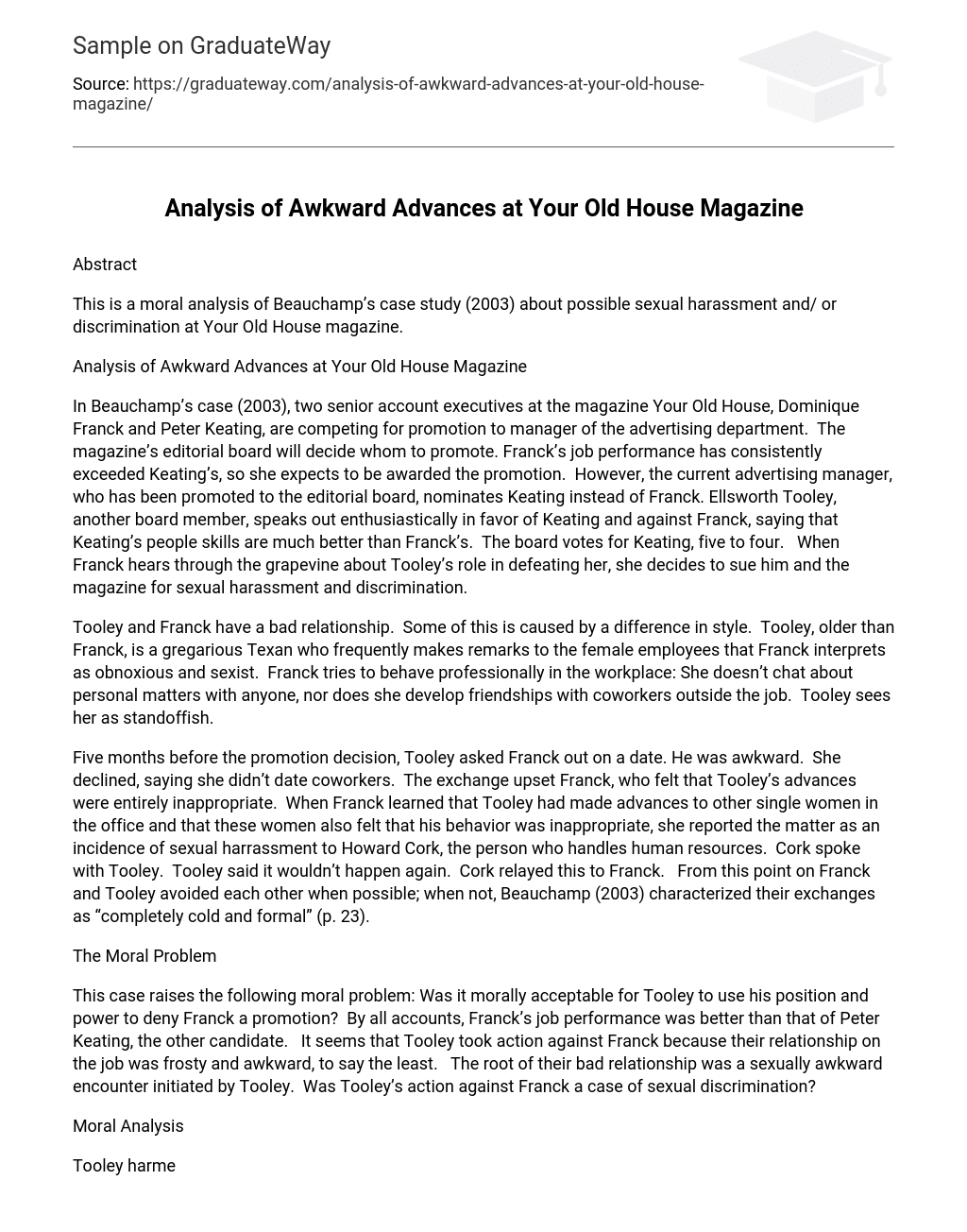Abstract
This is a moral analysis of Beauchamp’s case study (2003) about possible sexual harassment and/ or discrimination at Your Old House magazine.
Analysis of Awkward Advances at Your Old House Magazine
In Beauchamp’s case (2003), two senior account executives at the magazine Your Old House, Dominique Franck and Peter Keating, are competing for promotion to manager of the advertising department. The magazine’s editorial board will decide whom to promote. Franck’s job performance has consistently exceeded Keating’s, so she expects to be awarded the promotion. However, the current advertising manager, who has been promoted to the editorial board, nominates Keating instead of Franck. Ellsworth Tooley, another board member, speaks out enthusiastically in favor of Keating and against Franck, saying that Keating’s people skills are much better than Franck’s. The board votes for Keating, five to four. When Franck hears through the grapevine about Tooley’s role in defeating her, she decides to sue him and the magazine for sexual harassment and discrimination.
Tooley and Franck have a bad relationship. Some of this is caused by a difference in style. Tooley, older than Franck, is a gregarious Texan who frequently makes remarks to the female employees that Franck interprets as obnoxious and sexist. Franck tries to behave professionally in the workplace: She doesn’t chat about personal matters with anyone, nor does she develop friendships with coworkers outside the job. Tooley sees her as standoffish.
Five months before the promotion decision, Tooley asked Franck out on a date. He was awkward. She declined, saying she didn’t date coworkers. The exchange upset Franck, who felt that Tooley’s advances were entirely inappropriate. When Franck learned that Tooley had made advances to other single women in the office and that these women also felt that his behavior was inappropriate, she reported the matter as an incidence of sexual harrassment to Howard Cork, the person who handles human resources. Cork spoke with Tooley. Tooley said it wouldn’t happen again. Cork relayed this to Franck. From this point on Franck and Tooley avoided each other when possible; when not, Beauchamp (2003) characterized their exchanges as “completely cold and formal” (p. 23).
The Moral Problem
This case raises the following moral problem: Was it morally acceptable for Tooley to use his position and power to deny Franck a promotion? By all accounts, Franck’s job performance was better than that of Peter Keating, the other candidate. It seems that Tooley took action against Franck because their relationship on the job was frosty and awkward, to say the least. The root of their bad relationship was a sexually awkward encounter initiated by Tooley. Was Tooley’s action against Franck a case of sexual discrimination?
Moral Analysis
Tooley harmed Franck by denying her professional advancement. She acted in accordance with the standard social contract of the workplace in which professional behavior and superior results are rewarded with promotion and an increase in salary. However, by harming Tooley, Franck also acted to protect the organization, which will probably function more successfully with an advertising manager who doesn’t have relationship problems. Further, it is not unreasonable for interpersonal skills to be considered, along with other factors, when evaluating a candidate for promotion. And yet, one must ask if Tooley, as the person with more power relative to Franck, was not obligated to take some action that would restore professional, if not amicable, relations between himself and Franck. After all, it was his violation of her right to work without being sexually harassed that caused the problem. A simple apology could have put them back on a more temperate footing. His failure to remedy this smaller wrong is what caused their problem to grow. I think that when Tooley acted to prevent Franck’s promotion he was discriminating against her because she was a woman with whom he had had a sexually awkward encounter.
References
Beauchamp, Tom L. (2003). Case studies in business, society, and ethics (5th ed.). Englewood Cliffs: Prentice Hall.





